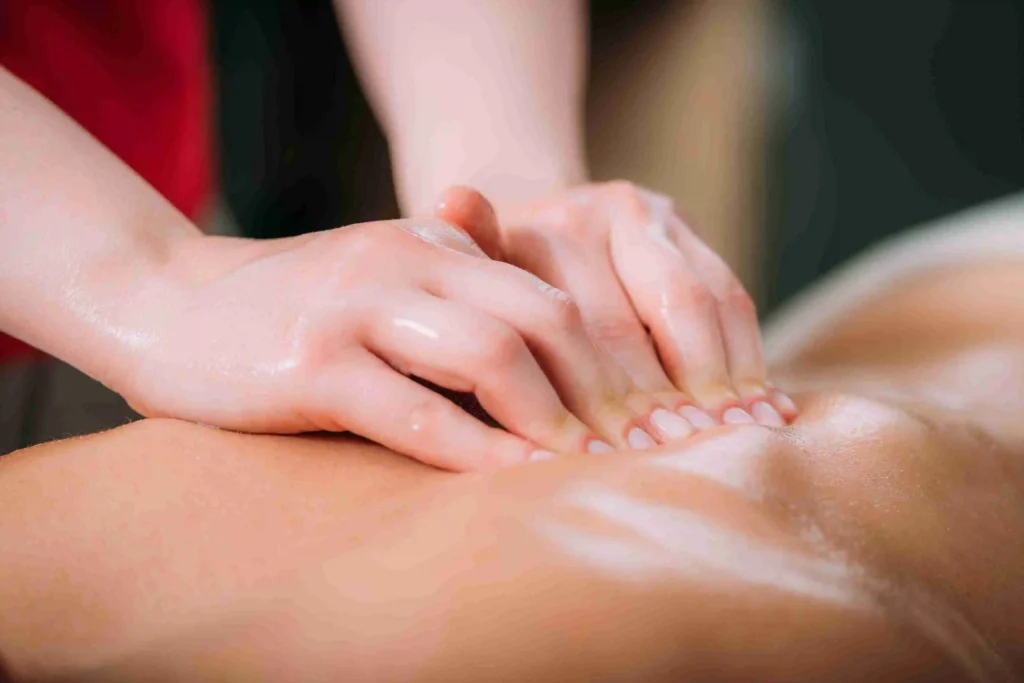DEEP TISSUE MASSAGE

Massage Deep Tissue: Therapeutic Method for Muscle Recovery and Pain Relief
Hi there, Having over forty years of expertise helping others heal, relax, and increase their general well-being, I am Sujatha G, a Medical Massage Therapist. Deep Tissue Massage is among the most potent and successful treatments I have encountered. Those with persistent pain, muscle tightness, or stiffness can find great benefit from this therapy approach. Let’s explore the goals of Deep Tissue Massage, its advantages, and how best to maximize your experience.
Deep tissue massages are what?
Focused on the deepest layers of muscle tissue, tendons, and fascia—the connective tissue encircling muscles—a Deep Tissue Massage is a specialist form of massage treatment. Deep tissue massage uses harder pressure and slower strokes to access deeper muscle layers, unlike a standard Swedish massage that is usually more relaxing and surface-level.
This massage aims mostly to release chronic muscular tension and break up muscle adhesions, sometimes referred to as “knots”. Particularly in the neck, shoulders, lower back, and legs, it’s perfect for treating injuries, tightness, and muscular strain. Although deep tissue massage might be strong, it is quite successful for reducing pain and restoring muscle action.
- Deep tissue massage is very helpful for those suffering with chronic pain including lower back discomfort, neck pain, or shoulder stiffness. Applying strict pressure on particular muscle parts helps ease discomfort, lower inflammation, and increase flexibility.
- Deep tissue massage improves blood circulation and helps to eliminate toxins from the muscles, so accelerating muscle recovery whether your level of activity is that of an athlete or just regular gym goer.
- Deep tissue massage helps relieve areas of tightness in your muscles whether you have persistent tension or knots. Targeting deeper levels of muscle and fascia helps one relax and lessens tension that would otherwise restrict mobility.
- Particularly in the neck, back, and shoulders, chronic muscular stress can compromise your posture. Deep tissue massage helps correct alignment and posture by working on specific muscle groups, therefore lowering the strain and pain risk.
- Enhanced blood flow brought about by the massage helps oxygenate the muscles and accelerates recovery by means of pressure exerted during it. Those having weak circulation or those recovering from an accident especially benefit from this.
- Deep tissue massage really helps to lower stress and anxiety even if its emphasis is on deep muscle layers. Deep relaxation’s emphasis aids the parasympathetic nervous system to be triggered, therefore fostering general peace and well-being.
- Deep tissue massage can assist lower scar tissue and adhesions resulting from a muscle injury or surgery, so enabling faster and more efficient healing.
Before to the visit: Getting ready for a deep tissue massage
Before your Deep Tissue Massage, you should be ready to guarantee that you will maximize the benefits and pleasure from it:
- Keep hydrated; sip lots of water before your massage. Maintaining hydration helps to guarantee that your muscles are lubricated and more pressure-sensitive, thereby lowering the danger of any pain throughout the massage.
- Eat Light: Steer clear of a large dinner just before your session. While a modest snack is okay, big or greasy meals can cause you to feel uncomfortable and slow throughout treatment.
- Steer clear of alcohol and coffee since they can interfere with your body’s capacity to relax and might increase your sensitivity to pain. You should steer clear of them at least several hours before your massage.
- Talk to your therapist regarding any areas of tension or discomfort before the appointment. Tell them whether you have sensitive areas that demand additional attention, chronic discomfort, or specific injuries.
- Try to unwind and quiet your head before your massage. Deep tissue treatment can be intensive, hence focusing on calm and a few deep breaths will help you maximize the session.
Maximizing the Results of Your Deep Tissue Massage: Aftercare
Following a few after-care advice can help you maximize the results of your deep tissue massage and aid in bodily healing once your session ends:
- Stay Hydrated: You really should sip lots of water following a deep tissue massage. Massage releases toxins from the muscles; water helps your system eliminate those poisons, therefore avoiding pain.
- After your massage, try to avoid rigorous physical activity or intense workouts for at least 24 hours. Your muscles require time to heal and completely get the advantages from the treatment.
- Rest: Give your body some time to heal. Deep tissue massage may make you tired and relaxed, thus you should let your muscles revitalize.
- If you feel stiff following the massage, simple stretching will help to keep flexibility and help to release muscular tension. Remember not to overreach—keep your stretches light and gentle.
- Steer clear of hot showers or baths shortly after the massage since they may cause your muscles to become too relaxed and perhaps induce pain, even although a warm shower may feel relaxing. Instead, choose a lukewarm shower.
- After a deep tissue massage, especially if it’s your first time or you have considerable muscular tension, you may feel some discomfort. See your therapist or doctor if the pain lasts or gets worse.
Who Should Get Deep Tissue Massage?
Those experiencing particularly helpful deep tissue massages are those coping with
- Deep tissue massage can help with chronic pain or muscular tension—especially in the neck, shoulders, lower back, or legs—by relaxing muscles.
- Athletes or Active Individuals: Deep tissue massage helps muscles heal and injuries are prevented for those who routinely exercise or have just worked out.
- Those with bad posture may find deep tissue massage helpful in realigning and releasing tension in the muscles, therefore enhancing general posture if back or neck pain results from poor posture.
- Those with tension or anxiety can benefit from deep tissue massage not only physically but also by encouraging deep relaxation and so relaxing the nervous system.
- Everybody Seeking a Deep Relaxation Experience Deep tissue massage is a great option if you want a strong, therapeutic massage that can help with tightness or chronic pain relief as well as relaxation
Who Should Not Try Massage Using Deep Tissue Techniques?
Although many people find great benefit from deep tissue massage, some should avoid it or seek medical advice before having the treatment:
- Pregnant women—especially those in their first trimester—should avoid deep tissue massages since they can put too much pressure on some body parts. Before receiving any type of massage during pregnancy, always speak with your healthcare physician.
- Those with specific medical conditions—such as rheumatoid arthritis, osteoporosis, or blood clotting disorders—may find deep tissue massage unsuitable. If you have underlying medical issues, always discuss with your doctor before undergoing any deep massage treatment.
- People with Wounds or Skin problems: Deep tissue massage may irritate those with open wounds, skin infections, or some skin problems including psoriasis or eczema. Beforehand, see your therapist to prevent any problems.
- Deep tissue massage might not be the greatest choice for those suffering severe pain or injuries, particularly if the discomfort is still in the inflammatory stage. Before choosing deep tissue treatment, give time for the damage to heal.
How Should One Select the Best Spa for Deep Tissue Massage?
Selecting a spa for your deep tissue massage should guarantee that you get expert, premium treatment. These elements should help you to think through:
- Select a facility featuring qualified, seasoned therapists focused in deep tissue massage. The therapist should be aware of the correct pressure and technique to use for your particular requirements.
- Finding a spa with a strong reputation requires reading reviews or consulting friends or relatives for suggestions. Seek for spas that give client happiness top priority and have good comments on their massage techniques.
- The spa should have a neat, cozy, and restful atmosphere. A peaceful surroundings improves the whole massage experience and facilitates your best use of your therapy.
- Good spas will customize the massage to your body’s tension areas and pay attention to your particular needs. Make sure the spa provides tailored consultations to handle your particular problems, such muscle tightness or persistent pain.
- Emphasize your well-being; the greatest spas give client care top priority and make sure your comfort comes first. They should also offer long-term relief follow-up recommendations and after-care guidance.
- Having worked in the massage therapy industry for more than forty years, I have seen the amazing effects of deep tissue massage. Although this therapy approach is a great technique to alleviate stress, muscle tension, and chronic pain, it is important to see a qualified and experienced therapist to guarantee a safe, successful encounter.
- One investment in your health and well-being is a deep tissue massage. The advantages for chronic pain, muscular repair, and relaxation are well worth it even if the intensity of this kind of massage may be higher than that of other forms. Deep tissue massage can provide long-lasting relief if you’re healing from an injury or if you suffer from continual muscular stress or stiffness. Your health is priceless, hence deciding to pay for this therapy can significantly affect your mental as well as physical state.
- Spend some time selecting the appropriate spa, expressing your demands, and reaping the many advantages of deep tissue massage. Your life and your body rightfully demand it.
Written by Sujatha G
Medical Massage Therapist at Spa Education
40 years experience as a Certified massage trainer
Medically reviewed by Varnisha
Ayur Vedic Treatment researcher 53 years experience

